by Amaka Nnamani, MD
copyright © 2024 Amaka Nnamani
“My breasts are yucky!”
“Does the baby put her mouth on the breasts?”
“Can I help Mommy breastfeed my baby?”
These are all statements made by children aged five to twelve who, like millions of their peers, know far too little about breastfeeding. Lack of knowledge about the potential risks of not breastfeeding has consequences, and lactation education is the way out.

In December of 2021, I made a difficult decision — the decision to leave my role as a full time outpatient pediatrician in a hospital-employed practice. See, I loved my job. My favorite part of my job was getting to be involved in the lives of my patients (or my kids as I called them). I celebrated their wins, and provided a shoulder to lean on in difficult times. I enjoyed watching them grow into independent beings and find their paths in life.
But after the birth of our third child in July of 2020 in the midst of a pandemic, and with increasing work demands, something had to give. I had to choose between advancing in my career and burning out, or being with my family. I wanted the best of both worlds, but that was not feasible. I chose my sanity, peace, and family.

At the time, I had no idea what I was going to do after leaving my job; it was anything but a perfectly planned exit. I just knew that I was exhausted and needed a break. For context, I’d had our first two children as a Pediatrics resident while my husband was unavoidably living in Nigeria. So I knew firsthand what exhaustion and burn out looked and felt like.
I chose to explore non-clinical aspects of myself in my time away, and within two months of leaving my job, I was determined to write a picture book on breastfeeding. I took free writing classes online through my public library, and then enrolled in a bootcamp for picture book authors. My book, Ziora’s Quest: Mommy’s Milk Rocks! was published on 08/27/2022, about six months after I’d resolved to write it.
The book tells the story of a six-year-old big sister who wished for a little sister but soon realizes that Sissy just wants to breastfeed all the time. “What’s the big deal about breastfeeding, anyway?” she wonders. She is transported through a portal to the amazing world of Milky White where she meets with her pediatrician and learns amazing fun facts about breast milk!
Education is Vital
Why is it necessary to educate our children about breastfeeding?

Breastfeeding has a myriad of benefits for mothers and infants. Women who breastfeed have lower rates of postpartum depression, rheumatoid arthritis, hypertension, type 2 diabetes, cardiovascular disease, and breast and ovarian cancer. Infants who are breastfed have reduced incidence of lower respiratory and gastrointestinal infections, allergies, sudden infant death syndrome (SIDS), obesity, childhood leukemia and lymphoma and neurobehavioral problems amongst many other debilitating childhood illnesses. Some studies have also found that breastfed children may have higher IQ scores. A study using a cohort of almost ten million infants born between 2016 and 2018 in the US showed that “breastfeeding promotion and support may be a strategy to reducing infant mortality in the US.”
Given the benefits, it might seem surprising that fewer moms than expected are nursing their infants. According to the 2022 US Breastfeeding Report Card, about 83% of women initiate breastfeeding, with 74% of mothers initiating breastfeeding in my home state of Pennsylvania. Under- resourced women –many of whom qualify for the Special Supplemental Nutrition for Women, Infant and Children (WIC) — have an estimated national breastfeeding rate of 40%.
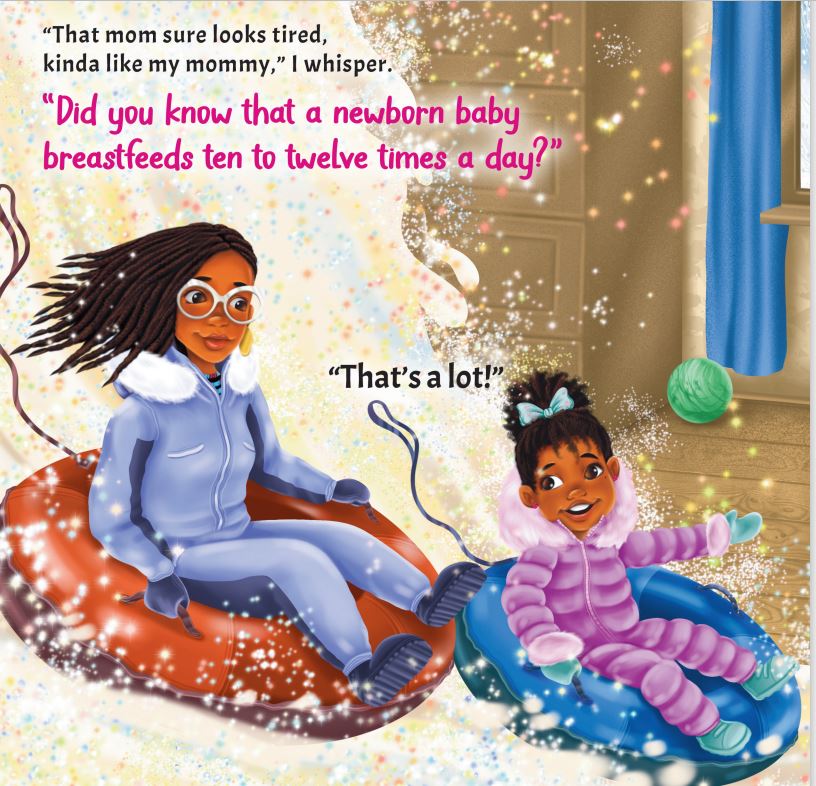
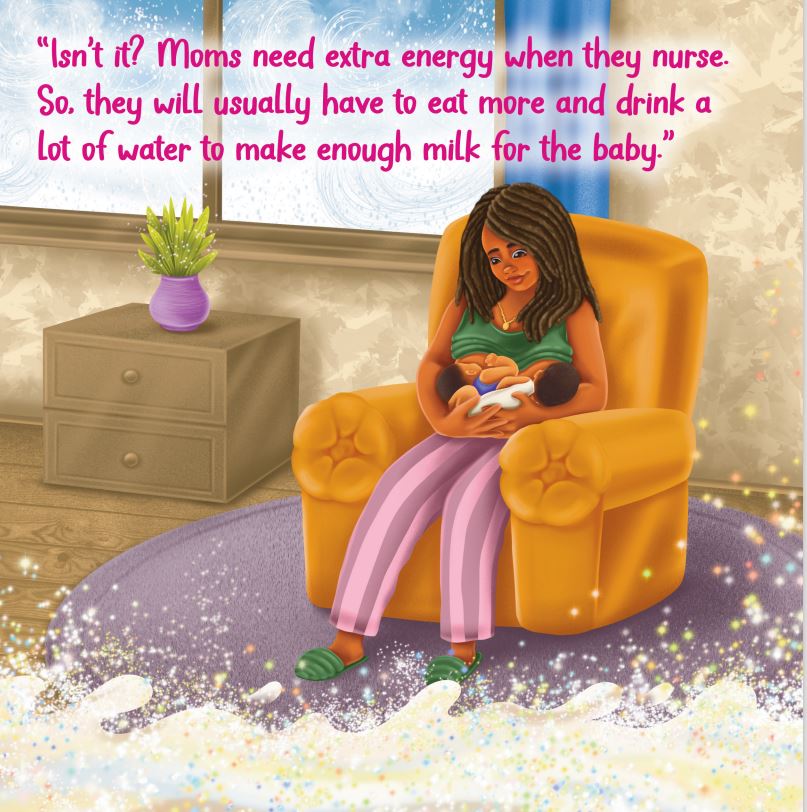
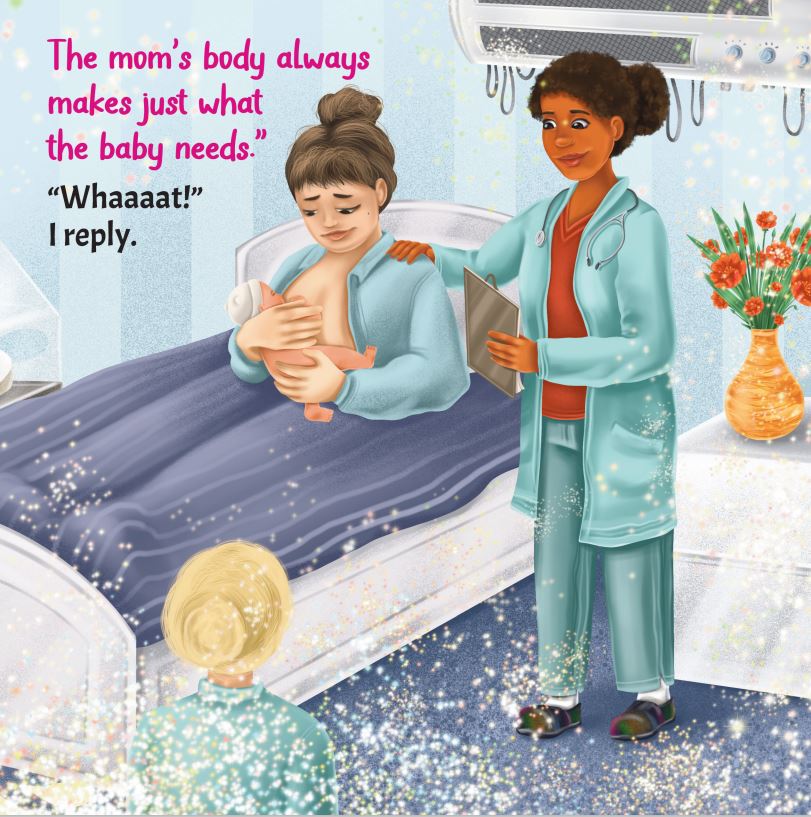
A lot of people know nothing or very little about the benefits of human milk. The first step to fixing this is by educating our children on its importance. Beliefs and attitudes and attitudes are shaped early in our lives by cultural, emotional and social factors. We learn most of these beliefs from our teachers, families and friends, which is why starting the talk early in children’s school years can have positive results. Education is the quiet, cost effective, and powerful weapon we should start with for not only improving the breastfeeding rates of our state and country but reducing the morbidity and mortality rates of mothers and children globally. Our children will grow up to become mothers, fathers, co- workers, legislators and employers.
An Unexpected Journey
My journey can be described as nothing short of serendipitous. Several opportunities and experiences had led up to exclusively breastfeeding my children, in spite of a lack of support (especially with my first two). I am a Chapter Breastfeeding Coordinator for the PA American Academy of Pediatrics, a moderator for the exclusive online FaceBook group for female physicians interested in lactation, DR. MILK, and several others.
Ziora’s Quest was an instant Amazon bestseller within days of its release, and won the Mom’s Choice Awards in October of 2022. Publishing my book has opened up a new path for me, one I might never have chosen for myself. Ziora’s Quest is used as an educational resource in WIC programs, hospitals, clinics and libraries. I am actively working on having it used in schools as an educational resource and as part of the curriculum in Health and Safety classes.
Today, I identify not only as a pediatrician but as an author, a consultant, a public speaker, advocate and public health practitioner. It is a testament to listening and following that inner voice that tells you, you are more than you know.
About the Author

Dr. Amaka Nnamani is a board-certified general pediatrician, consultant and speaker on a mission to advance breastfeeding equity and belonging, one person and community at a time. She is a two-time grant awardee from the PA Department of Health (to improve the breastfeeding rates in marginalized communities). Dr. Nnamani is a Chapter Breastfeeding Coordinator for the PA AAP, sits on the Medical Advisory Board of the Mid Atlantic Mothers’ Milk Bank and is one of the Co-Chairs for the Advocacy Committee of the Pennsylvania AAP. She is also the Chair for the PA Breastfeeding Coalition and the Breastfeeding Expert on the PA WIC Advisory Board.
Her advocacy and work have been featured on NPR, the BBC, ABC, the AAP, SiriusXM’s Doctor Radio, amongst many other media outlets. She has also testified in front of legislators on the importance of child nutrition (specifically breastfeeding), and advocates for policy reform with regards to paid maternal leave and breastfeeding support.
She has partnered with different state WIC programs and agencies to use her book as an educational tool for its participants. She finds a lot of joy in speaking about issues related to breastfeeding, addressing social determinants of health (and its intersections with information poverty) and being an advocate for children on different levels. She also particularly enjoys hosting read alouds of her book at libraries, book stores and several other outlets with a goal to empower and educate while entertaining children on the benefits of breastfeeding.
In her spare time, Dr. Nnamani loves to spend time with her husband of 14 years and her three beautiful children, all of whom were breastfed. The spa, the library and the beach are her happy places. A self-proclaimed fashionista, she also enjoys reading books on personal development, biographies/autobiographies and loves to travel, dance and watch comedies.
Watch this interview with Dr. Nnamani:
Related Articles
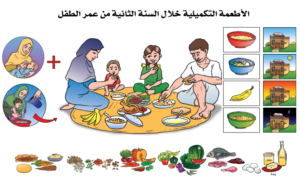
During Crises, Mother-to-Mother Groups Benefit Moms and Babies
FHI 360 supports mother-to-mother groups in Yemen, helping combat malnutrition amid the ongoing crisis. These groups educate women on proper infant feeding practices, improving child health, and empowering mothers with accurate information and peer support.
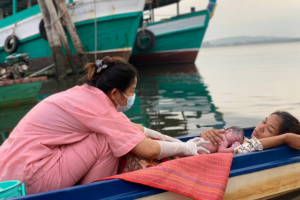
A Midwife Supports Births at Sea in Cambodia
In Cambodia’s remote Koh Kong province, a skilled midwife navigates unexpected births at sea, highlighting the challenges and triumphs of providing essential care to newborns outside the hospital setting.
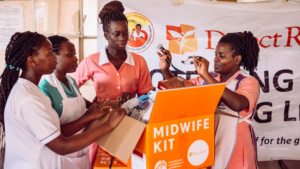
Climate Change Hurts Mothers and Babies. Midwives Are on the Frontlines.
As rising heat and disasters affect pregnancy and birth outcomes, midwives are working to ensure a safer, more sustainable future.
